뉴스&스피킹(영자신문)
하루 10분이면 영어에 대한 두려움을 극복하고 누구나 유창하게 영어를 구사하실 수 있습니다.
-
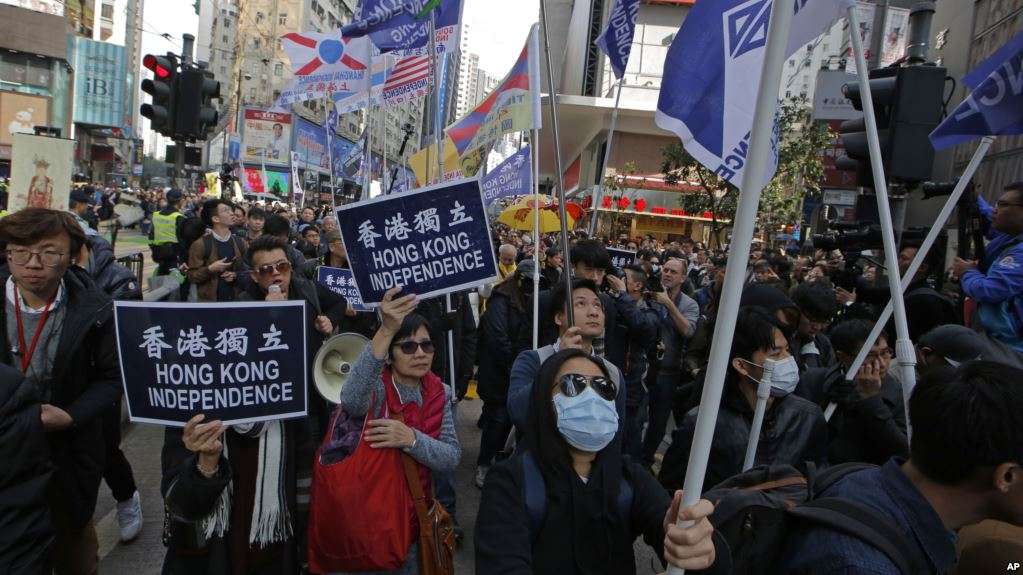 Study Finds Half of Hong Kong Youth Want to Live Elsewhere A new study has found that about half of Hong Kong’s young people would choose to live somewhere else if given the chance.
Study Finds Half of Hong Kong Youth Want to Live Elsewhere A new study has found that about half of Hong Kong’s young people would choose to live somewhere else if given the chance.
The public opinion study was carried out last month by Chinese University of Hong Kong’s Institute of Asia-Pacific Studies.
It found that overall, 34 percent of people in Hong Kong said they would choose to leave the territory to live elsewhere. More than 16 percent reported they had already begun making preparations to leave Hong Kong.
The group with the most people who said they want to leave Hong Kong was between the ages of 18-30. Fifty-one percent of this group said they would want to leave if given the chance. This compared to just 21 percent of people over age 50.
The study found that nearly 48 percent of people with a college degree or higher said they would rather live somewhere else.
About 25 percent of those questioned said growing political and social tensions in Hong Kong were major reasons they would seek to leave. Another 17 percent said they were "dissatisfied with the political institutions."
The most popular country people said they would like to move to was Canada, chosen by 19 percent of those questioned. Eighteen percent said Australia and 11 percent said Taiwan.
More than a third of those hoping to leave Hong Kong said they were seeking more living space. Twenty-two percent hoped for better air quality and less pollution.
About 15 percent said they were in search of "more liberty” and better human rights.
Andrew Shum is a member of the Hong Kong-based human rights group Civil Rights Observer. He says one of the main reasons people want to leave Hong Kong is the government's failure to permit fully democratic elections.
"People's demand for universal suffrage has yet to be realized," Shum said. "We had thought we were going to get a basic system that respected the choice of citizens through free and fair elections." Shum added that hopes for more democratic changes in Hong Kong had “collapsed” for many people.
In 2014, parts of Hong Kong were shut down during 79 days of demonstrations held to protest Chinese plans to restrict fully free elections in Hong Kong. The Hong Kong government considered the demonstrations illegal and moved to end them.
I’m Bryan Lynn.
View -
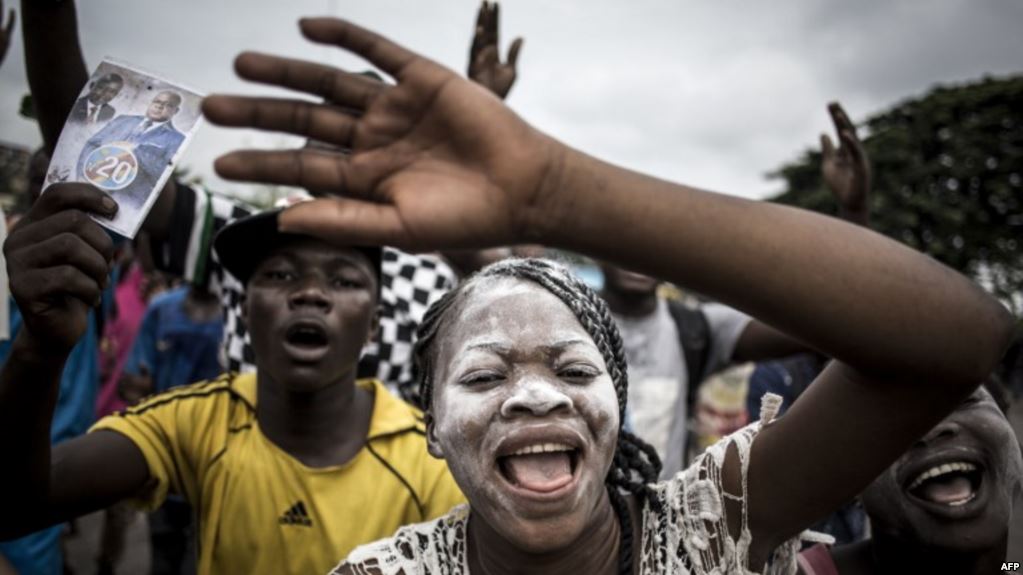 Catholic Church Rejects DRC's Presidential Vote The Catholic Church rejected the official result of the Democratic Republic of the Congo’s presidential election on Thursday. And the losing candidate called the result a “robbery.”
Catholic Church Rejects DRC's Presidential Vote The Catholic Church rejected the official result of the Democratic Republic of the Congo’s presidential election on Thursday. And the losing candidate called the result a “robbery.”
Election officials announced that opposition candidate Felix Tshisekedi won the election. He is set to replace President Joseph Kabila, who has ruled the Democratic Republic of the Congo for 18 years.
But pre-election studies had predicted an easy win for Martin Fayulu, another opposition candidate.
The influential Catholic Church had 40,000 observers at voting stations across the country. It said its own findings did not support the official results. Three diplomats briefed on the Church’s mission said their findings clearly showed Fayulu had won.
The Church said in a statement, “The results from the presidential election as published by CENI [Independent National Electoral Commission] do not correspondto the data collected by our observation mission from polling stations and vote counts.”
Fayulu claimed that election officials helped Tshisekedi to win as part of a deal to protect members of the outgoing Kabila administration. He called the official result a “robbery” and asked supporters to “rise as one man to protect victory.”
Fayulu has led anti-government demonstrations. He has also spoken out against corruption in the Congo, a country rich with minerals.
It was not clear whether Fayulu would dispute the election results in court. He has two days after the announcement of official results to file official disputes. The constitutional court then has seven days to consider disputes before results are final.
Tshisekedi’s supporters celebrated his victory. But Thursday’s action by the Church could make it harder for him to win wider acceptance.
An official from the United Nations’ peacekeeping operations said Tshisekedi’s win might lead to some temporary calm. But the official told the Reuters news agency that former militia and political supporters of Fayulu might rebel.
Police said three people were killed in the eastern city of Kikwit, where Fayulu received strong support. But much of the country appears to be staying calm.
Many Congolese fear that a dispute could restart violence. Civil wars in the Democratic Republic of the Congo have killed millions of people since the 1990s.
“Opposite of what we expected”
The international community has not congratulated Tshisekedi on his victory. Many appeared to be watching for the reactions of Fayulu’s supporters.
French Foreign Minister Jean-Yves Le Drian said the results “are the opposite to what we expected.”
Britain’s foreign secretary, Jeremy Hunt, said he was “very concerned” about reported differences in Congo’s results. He added that the United Nations Security Council would discuss the issue on Friday.
European Union spokeswoman Maja Kocijancic said, "We are also waiting for the reactions of different observation missions that have observed the elections…and partners, particularly in Africa.”
Over the past week, the United States and other governments have called on the electoral commission to publish correct election results. The U.S. has also deployed troops in nearby Gabon and has urged American citizens to leave Congo because of security concerns.
I'm Mario Ritter Jr.View -
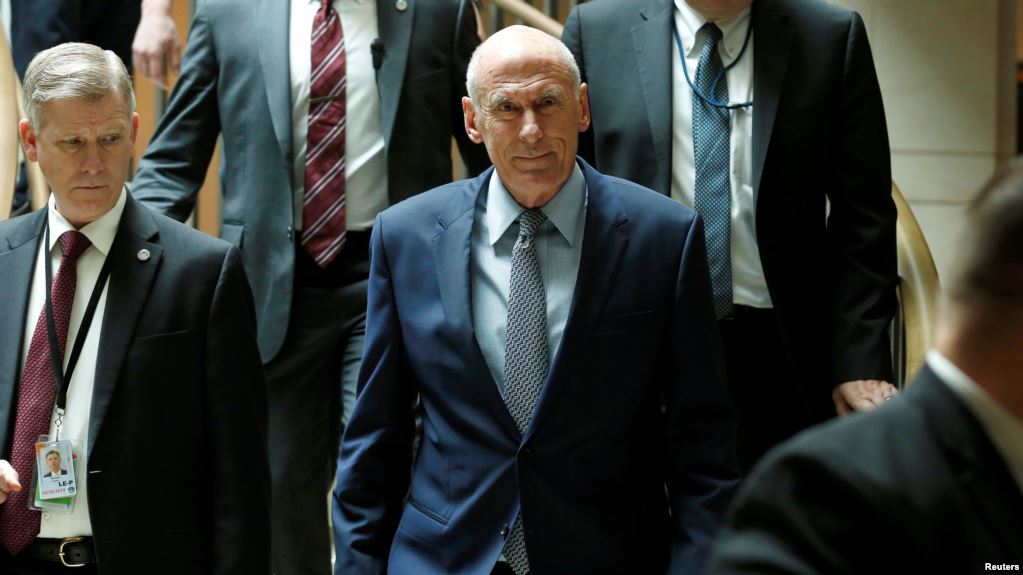 US Intelligence Chief Warns of China’s Improved Cyber Spying China’s growing expertise with computers is a bigger threat to the United States than Russia’s attempts to influence American elections.
US Intelligence Chief Warns of China’s Improved Cyber Spying China’s growing expertise with computers is a bigger threat to the United States than Russia’s attempts to influence American elections.
That claim comes from the U.S. Director of National Intelligence, Dan Coats. He warns that China is on a path to possibly become more powerful than any other country.
Coats spoke at a cyber security conference this week at The Citadel military college in Charleston, South Carolina.
The U.S. official said China’s slow and careful operations helped the government escape the kind of publicity that has followed Russia’s actions.
Most worrisome, he said, is the way in which the government is using its ties with the rest of the world to test and improve its computer technology in China.
Coats said China has used its campaign on Muslims in the Xinjiang area as a testing ground for such technology.
Intelligence officials and human rights groups estimate that China has detained more than 1 million Uyghurs and other Muslims, including families and children. The detainees reportedly have been sent to re-education centers, where they are forced to reject their religion and their culture.
Intelligence gathering measures
But Coats said the re-education centers are just the start. He warned that officials in China’s Northwest have set up high-tech spying operations, including the collection of DNA and other biological information.
Coats added that China is experimenting with a "social credit ratings program," using computers to decide access to bank loans, schooling and even medical care.
He warned that the Chinese government also "threatens the export of these tools” to other governments.
An attempt to reach China’s embassy in Washington for reaction to Coats' comments went unanswered.
One Chinese official said last week that China’s use of information technology is no more invasive than that used by Western countries like Britain.
'Huge concerns'
Some U.S. officials fear China could use Chinese-made products to spy on Americans.
Lieutenant General Robert Ashley, director of the Defense Intelligence Agency, is one of them.
"Do I have concerns with the Chinese?" he said. "Huge concerns with regards to their ability to leverage their industry."
Already, the U.S. Defense Department has banned on its military bases the sale of mobile telephones by two Chinese companies because of possible security risks.
And military officials, like Ashley, are increasingly worried about the large number of Chinese-made parts in computers and the effect that could have.
Ashley said, "My bigger concern may not necessarily be what's taking place on the battlespace if I can't turn the power on."
Cyber targets
The U.S. National Counterintelligence and Security Center reported in July that Chinese cyber spying mostly targets businesses working with the defense department. But the report said it also spies on information technology and communications companies.
U.S. intelligence officials are also increasingly concerned that China’s efforts, while methodical, are becoming increasingly aggressive.
China is no longer "hiding its strengths” Coats warned.
He said that China is working against the shared values of the international community, including protecting, in his words, "personal privacy, the free flow of information and the protection of commercial secrets."
I'm Caty Weaver.View -
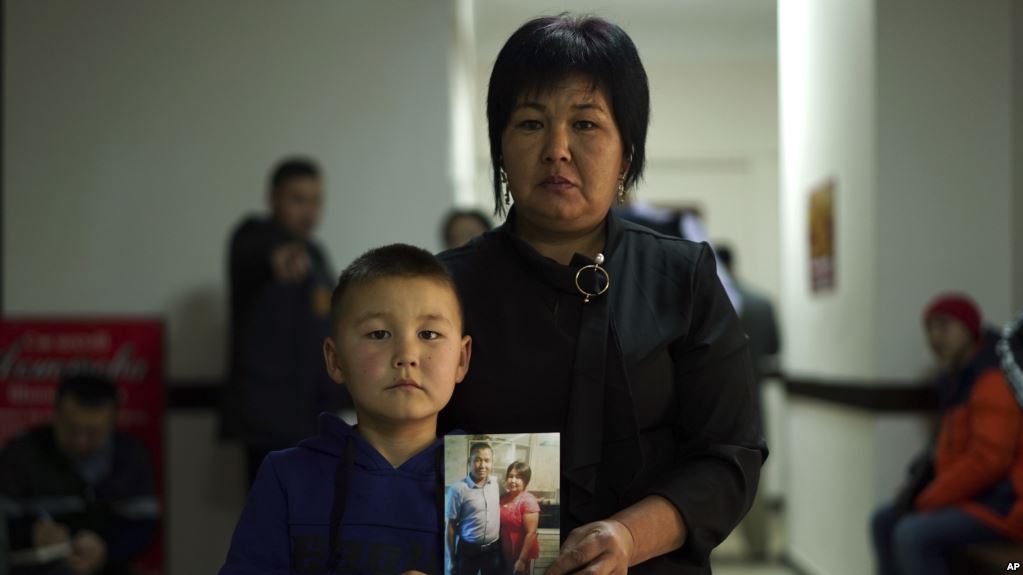 China Lets 2,000 Kazakhs Leave Xinjiang, Return Home China is permitting more than 2,000 ethnic Kazakhs to surrender their Chinese citizenship and leave the country, the Kazakh Foreign Ministry said this week.
China Lets 2,000 Kazakhs Leave Xinjiang, Return Home China is permitting more than 2,000 ethnic Kazakhs to surrender their Chinese citizenship and leave the country, the Kazakh Foreign Ministry said this week.
The move may be a sign that China is feeling international pressure about its widespread detention of Muslims in the country’s far western Xinjiang area.
The detention of ethnic Uyghur, Kazakh and other minorities in internment camps has caused tension between China and neighboring Kazakhstan. China is a major trading partner, and Kazakhstan’s state-restricted media had mostly avoided reporting on the issue.
But activists say pressure for action has slowly increased, following an Associated Press story on the camps in May and other international media reports.
The Kazakh Foreign Ministry has confirmed that China has agreed to let over 2,000 ethnic Kazakhs leave. It did not say who could leave or why they were able to leave. Those people will now be able to request Kazakh citizenship or permanent residency, Kazakh officials told the AP.
The Chinese Foreign Ministry did not answer an AP request for comment.
In recent years, Chinese officials have carried out a severe policing and detention campaign in the large, resource-rich Xinjiang region. Rights groups and experts have estimated that possibly 1 million people are being held in what China has called “re-education” camps.
Former detainees have said they were forced to reject their culture and religion and subjected to political teachings.
News of the detentions has sent fear throughout the small, close community of Chinese-born Kazakhs now living in Kazakhstan. Many left China in the last few years for work or to educate their children in Kazakh schools, as restrictions in Xinjiang increased.
Hundreds lost contact with family members still there. Many began writing letters and attending press conferences. They hoped that greater publicity would help them find their relatives.
Serikzhan Bilash is head of the advocacy group Atajurt. He said he senses a small change in the Kazakh government’s position. He says that last year officials warned him many times to end his activism activities. Now, he says, the warnings have stopped. He was even recently invited onto a popular Kazakh talk show. He says he felt the move was a sign of growing approval of his efforts to publicize the difficulties of detained Kazakhs.
“I said that Chinese officials are dangerous for Central Asia, for Kazakhstan,” Bilash said. “They’re starting to accept my opinion now.”
While they have avoided criticizing China, Kazakh diplomats have worked to secure the release of their own citizens in Xinjiang. Foreign Ministry officials said in November that China had detained 29 Kazakh citizens, and 15 had since been released and permitted to enter Kazakhstan.
Gene Bunin is an activist who has collected stories from about 2,000 relatives of detainees in Xinjiang. He estimates that about 20 people, possibly more, were permitted to return to Kazakhstan last year. Bunin has noted another 70 or so who have been released from camps but kept in their home villages in Xinjiang and not permitted to leave China.
“They’ve been getting released since September,” said Bunin, who lived in Xinjiang until last year. “I suspect it’s sort of an appeasement thing going on, where they’re trying to satisfy the relatives, to defuse tensions.”
Those permitted to return so far have been largely Kazakh citizens or those with Kazakh partners or children.
One 23-year-old Kazakh citizen, who asked to be identified only by Guli was able to return from Xinjiang in July. She had been separated from her husband and two children for more than two years. She said she cried after a Kazakh official called to say she might be able to return.
Guli said, “I thought I’d never be able to go back to Kazakhstan again, that I wouldn’t able to see my kids again. I had lost all hope.”
I’m Ashley Thompson.
I'm Caty Weaver.View -
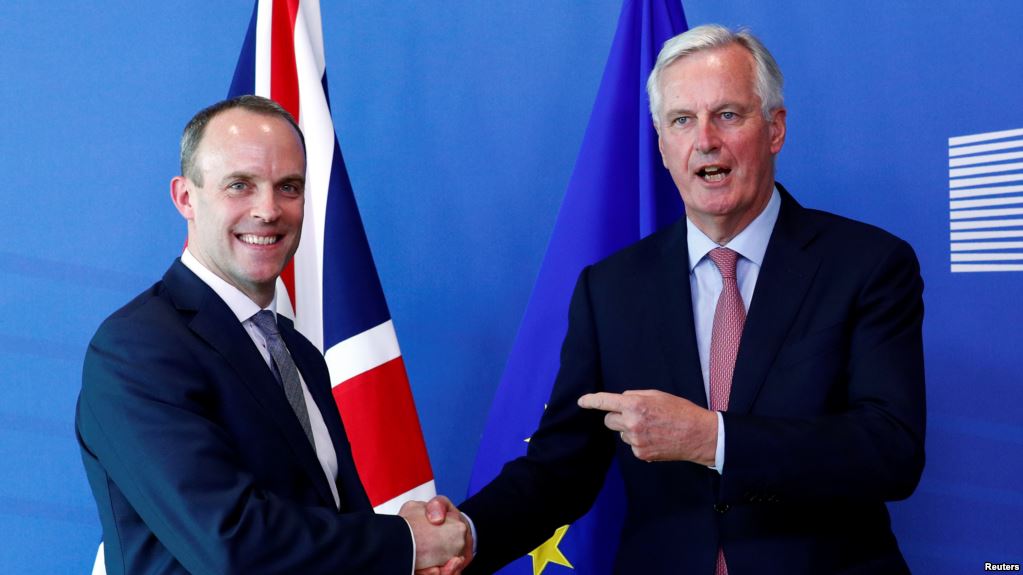 Will Britain's Withdrawal from the EU Be the End of the World? Britain’s withdrawal from the European Union (EU) is coming soon and so is the end of the world, if you believe the British newspapers.
Will Britain's Withdrawal from the EU Be the End of the World? Britain’s withdrawal from the European Union (EU) is coming soon and so is the end of the world, if you believe the British newspapers.
Those reports tell of possible food shortages, grounded flights and troops sent to guard British streets if no agreement is reached.
Positions of both sides appeared to harden. British officials have said they are preparing for no deal on their country’s withdrawal, also known as Brexit. They warned that it could affect European trade.
Prime Minister Theresa May said only that the government was preparing for every possibility.
All the warnings show the difficulty of finding a way to end trade ties that have developed since Britain became an EU member in 1973, explained Ben Fletcher. He is the director of the manufacturer's association EEF.
"We are attempting to reverse 40 years of integration in a four- to six-week negotiation," Fletcher said. "This is a degree of complexity like splitting the atom…We have to understand how hard that is."
Little time left for deal
More than two years after Britain voted to leave the EU, time is growing short. Britain is set to leave the EU on March 29, 2019. In order for EU countries to have time to approve any deal, both sides say they need to come to an agreement by October.
Without a deal, 40 years of free trade between Britain and Europe will end. This would lead to tariffs and border inspections that could delay shipments of everything from food and fuel to clothing and cars. In addition, Britain would no longer be a part of Europe-wide agreements that govern air traffic and prescription drugs.
Recent comments by Brexit Secretary Dominic Raab and Health Secretary Matt Hancock shocked people in Britain. The two men were speaking about the government's preparations for the withdrawal. Their comments led newspapers to write about trucks lined up for at international borders and travelers waiting for hours at passport control.
May said that while she expects to negotiate a deal that will let trade continue, the government is doing the right thing in preparing for "every eventuality."
“It is about making sure that we'll be able to continue to do the things that are necessary once we've left the European Union, if we leave without a deal," she said.
On Tuesday, British officials in Dover, released a report explaining how a no-deal Brexit would affect Europe's busiest port.
The report said there will be a line of trucks waiting to cross the English Channel, creating a gridlock as far as 65 kilometers inland. About 10,000 trade trucks pass through Dover on a busy day. That is one-sixth of Britain's trade in goods, with a value of $156 billion a year. Some 99 percent of those products moved through the port from other EU countries.
Companies prepare for problems
The drug company Sanofi has begun to keep more medicines and vaccines in Britain than usual as part of its planning for possible transportation delays after Brexit.
Ireland-based Ryanair, Europe's busiest airline, plans to add warnings on its tickets. The warning will say the company will not accept the ticket if Brexit causes flight problems after March 29.
Stories like this are too much for Brexit supporters like Marcus Fysh, a member of Britain’s parliament from the governing Conservative Party. Fysh accused the government of trying to frighten people so they will accept a weaker agreement with the EU.
"That is irresponsible, and it should stop right now," he said. "And they should get behind Brexit, which people voted for."
Last month, Britain’s government released its offer to the EU. The proposal would end free movement of labor and the rule of the European Court of Justice. It would, however, accept a customs union for trade in goods and agricultural products. The offer was quickly rejected by EU negotiator Michel Barnier. He said Britain cannot enjoy free trade with the European markets if it does not accept the EU’s other policies.
Foreign Secretary Jeremy Hunt urged France and Germany to use their power with the European Commission to prevent a bad agreement.
"There is a real chance of no deal by accident," he told the Evening Standard. "Everyone is assuming, no, no, no, this will never happen. Well, actually, it could."
I’m Susan Shand.View

